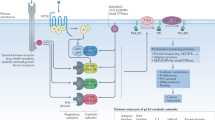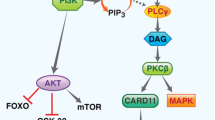Abstract
The phosphoinositide 3-kinase (PI3K)/Akt/mTOR pathway is implicated in the pathogenesis of lymphoma. Deeper understanding of the diversity and biological impact of this pathway has led to the development of specific inhibitors to this pathway. Preclinical data in cell lines, patient samples and disease models have broadened our understanding of PI3K inhibition. Several PI3K inhibitors are currently in advanced stages of clinical development. Idelalisib is the first agent of this new substance class to be approved in chronic lymphocytic leukemia and follicular lymphoma. Other agents specifically target different PI3K isoforms and show promising clinical efficacy.

Similar content being viewed by others
References
Cantley LC. The phosphoinositide 3-kinase pathway. Science (New York, NY). 2002;296(5573):1655–7.
Liu P, Cheng H, Roberts TM, Zhao JJ. Targeting the phosphoinositide 3-kinase pathway in cancer. Nat Rev Drug Discov. 2009;8(8):627–44.
Vanhaesebroeck B, Leevers SJ, Panayotou G, Waterfield MD. Phosphoinositide 3-kinases: a conserved family of signal transducers. Trends Biochem Sci. 1997;22(7):267–72.
Vanhaesebroeck B, Stephens L, Hawkins P. PI3K signalling: the path to discovery and understanding. Nat Rev Mol Cell Biol. 2012;13(3):195–203.
Katso R, Okkenhaug K, Ahmadi K, White S, Timms J, Waterfield MD. Cellular function of phosphoinositide 3-kinases: implications for development, homeostasis, and cancer. Annu Rev Cell Dev Biol. 2001;17:615–75.
Engelman JA, Luo J, Cantley LC. The evolution of phosphatidylinositol 3-kinases as regulators of growth and metabolism. Nat Rev Genet. 2006;7(8):606–19.
Song MS, Salmena L, Pandolfi PP. The functions and regulation of the PTEN tumour suppressor. Nat Rev Mol Cell Biol. 2012;13(5):283–96.
Blachly JS, Baiocchi RA. Targeting PI3-kinase (PI3K), AKT and mTOR axis in lymphoma. Br J Haematol. 2014;167(1):19–32.
Okkenhaug K, Vanhaesebroeck B. PI3K-signalling in B- and T-cells: insights from gene-targeted mice. Biochem Soc Trans. 2003;31(Pt 1):270–4.
Rommel C, Camps M, Ji H. PI3K delta and PI3K gamma: partners in crime in inflammation in rheumatoid arthritis and beyond? Nat Rev Immunol. 2007;7(3):191–201.
Kracker S, Curtis J, Ibrahim MA, Sediva A, Salisbury J, Campr V, et al. Occurrence of B-cell lymphomas in patients with activated phosphoinositide 3-kinase delta syndrome. J Allergy Clin Immunol. 2014;134(1):233–6.
Crank MC, Grossman JK, Moir S, Pittaluga S, Buckner CM, Kardava L, et al. Mutations in PIK3CD can cause hyper IgM syndrome (HIGM) associated with increased cancer susceptibility. J Clin Immunol. 2014;34(3):272–6.
Berenjeno IM, Guillermet-Guibert J, Pearce W, Gray A, Fleming S, Vanhaesebroeck B. Both p110alpha and p110beta isoforms of PI3K can modulate the impact of loss-of-function of the PTEN tumour suppressor. Biochem J. 2012;442(1):151–9.
Nakamura M, Nakashima S, Katagiri Y, Nozawa Y. Effect of wortmannin and 2-(4-morpholinyl)-8-phenyl-4H-1-benzopyran-4-one (LY294002) on N-formyl-methionyl-leucyl-phenylalanine-induced phospholipase D activation in differentiated HL60 cells: possible involvement of phosphatidylinositol 3-kinase in phospholipase D activation. Biochem Pharmacol. 1997;53(12):1929–36.
Knight ZA, Shokat KM. Chemically targeting the PI3K family. Biochem Soc Trans. 2007;35(Pt 2):245–9.
Marone R, Cmiljanovic V, Giese B, Wymann MP. Targeting phosphoinositide 3-kinase: moving towards therapy. Biochim Biophys Acta. 2008;1784(1):159–85.
Jamieson S, Flanagan JU, Kolekar S, Buchanan C, Kendall JD, Lee WJ, et al. A drug targeting only p110alpha can block phosphoinositide 3-kinase signalling and tumour growth in certain cell types. Biochem J. 2011;438(1):53–62.
Jackson SP, Schoenwaelder SM, Goncalves I, Nesbitt WS, Yap CL, Wright CE, et al. PI 3-kinase p110beta: a new target for antithrombotic therapy. Nat Med. 2005;11(5):507–14.
Lannutti BJ, Meadows SA, Herman SE, Kashishian A, Steiner B, Johnson AJ, et al. CAL-101, a p110delta selective phosphatidylinositol-3-kinase inhibitor for the treatment of B-cell malignancies, inhibits PI3K signaling and cellular viability. Blood. 2011;117(2):591–4.
Chaussade C, Rewcastle GW, Kendall JD, Denny WA, Cho K, Gronning LM, et al. Evidence for functional redundancy of class IA PI3K isoforms in insulin signalling. Biochem J. 2007;404(3):449–58.
Winkler DG, Faia KL, DiNitto JP, Ali JA, White KF, Brophy EE, et al. PI3K-delta and PI3K-gamma inhibition by IPI-145 abrogates immune responses and suppresses activity in autoimmune and inflammatory disease models. Chem Biol. 2013;20(11):1364–74.
Hutter G, Zimmermann Y, Zoellner AK, Irrgang P, Weigert O, Hiddemann W, et al. Combination of PI3K and PDPK1 inhibitors is highly effective in mantle cell lymphoma. Blood. 2014;124(21):3123.
Brown JR, Byrd JC, Coutre SE, Benson DM, Flinn IW, Wagner-Johnston ND, et al. Idelalisib, an inhibitor of phosphatidylinositol 3-kinase p110delta, for relapsed/refractory chronic lymphocytic leukemia. Blood. 2014;123(22):3390–7.
Furman RR, Sharman JP, Coutre SE, Cheson BD, Pagel JM, Hillmen P, et al. Idelalisib and rituximab in relapsed chronic lymphocytic leukemia. N Engl J Med. 2014;370(11):997–1007.
Hoellenriegel J, Meadows SA, Sivina M, Wierda WG, Kantarjian H, Keating MJ, et al. The phosphoinositide 3’-kinase delta inhibitor, CAL-101, inhibits B-cell receptor signaling and chemokine networks in chronic lymphocytic leukemia. Blood. 2011;118(13):3603–12.
Sharman JP, Coutre SE, Furman RF, Cheson BD, Pagel JM, Hillmen P, et al. Second interim analysis of a phase 3 study of idelalisib (ZYDELIG®) plus rituximab (R) for relapsed chronic lymphocytic leukemia (CLL): efficacy analysis in patient subpopulations with Del(17p) and other adverse prognostic factors. Blood. 2014:Abstract 330.
O’BrienS., Lamanna N, Kipps TJ, Flinn IW, Zelenetz AD, Burger JA, et al. Update on a phase 2 study of idelalisib in combination with rituximab in treatment-naïve patients ≥65 years with chronic lymphocytic leukemia (CLL) or small lymphocytic lymphoma (SLL). Blood. 2014:Abstract 1994.
Furman R, de Vos S, Barrientos JC, Schreeder MT, Flinn IW, Sharman JP, et al. Long-term follow-up of a phase 1 study of idelalisib (ZYDELIG®) in combination with anti-CD20 antibodies (rituximab [R] or ofatumumab [O]) in patients with relapsed or refractory chronic lymphocytic leukemia (CLL). Blood. 2014;124(21) [abstract 5653].
Barrientos JC, Coutre SE, de Vos S, Wagner-Johnston NC, Flinn IW, Sharman JP, et al. Long-term follow-up of a phase 1 trial of idelalisib (ZYDELIG®) in combination with bendamustine (B), bendamustine/rituximab (BR), fludarabine (F), chlorambucil (Chl), or chlorambucil/rituximab (ChlR) in patients with relapsed or refractory chronic lymphocytic leukemia (CLL). Blood. 2014:Abstract 3343.
Zelenetz AD, Robak T, Coiffier B, Delgado J, Marlton P, Adewoye AH, et al. Idelalisib plus bendamustine and rituximab (BR) is superior to BR alone in patients with relapsed/refractory chronic lymphocytic leukemia: results of a phase 3 randomized double-blind placebo-controlled study. Blood. 2015:LBA 5.
Flinn IW, Kahl BS, Leonard JP, Furman RR, Brown JR, Byrd JC, et al. Idelalisib, a selective inhibitor of phosphatidylinositol 3-kinase-delta, as therapy for previously treated indolent non-Hodgkin lymphoma. Blood. 2014;123(22):3406–13.
Gopal AK, Kahl BS, de Vos S, Wagner-Johnston ND, Schuster SJ, Jurczak WJ, et al. PI3Kdelta inhibition by idelalisib in patients with relapsed indolent lymphoma. N Engl J Med. 2014;370(11):1008–18.
Gopal AK, Kahl BS, de Vos S, Wagner-Johnston ND, Schuster SJ, Jurczak W, et al. Mature follow up from a phase 2 study of PI3K-delta inhibitor idelalisib in patients with double (rituximab and alkylating agent)-refractory indolent B-cell non-hodgkin lymphoma (iNHL). Blood. 2014:Abstract 1708.
de Vos S, Wagner-Johnston ND, Coutre SE, Flinn I, Schreeder MT, Fowler N, et al. Durable responses following treatment with the PI3K-delta inhibitor idelalisib in combination with rituximab, bendamustine, or both, in recurrent indolent non-Hodgkin lymphoma: phase I/II results. Blood. 2014:Abstract 3063.
Kahl BS, Spurgeon SE, Furman RR, Flinn IW, Coutre SE, Brown JR, et al. A phase 1 study of the PI3Kdelta inhibitor idelalisib in patients with relapsed/refractory mantle cell lymphoma (MCL). Blood. 2014;123(22):3398–405.
Wagner-Johnston ND, De Vos S, Leonard J, Sharman JP, Schreeder MT, Boccia RV, et al. Preliminary results of PI3Kδ inhibitor idelalisib (GS-1101) treatment in combination with everolimus, bortezomib, or bendamustine/rituximab in patients with previously treated mantle cell lymphoma (MCL). J Clin Oncol. 2013;31(suppl):Abstract 8501.
Coutre SE, Barrientos JC, Brown JR, de Vos S, Furman RR, Keating MJ, et al. Management of adverse events associated with idelalisib treatment: expert panel opinion. Leuk Lymphoma. 2015;56(10):2779–86.
O’Brien S, Patel M, Kahl BS, Horwitz SM, Foss FM, Prcu P, et al. Duvelisib (IPI-145), a PI3K-δ,γ inhibitor, is clinically active in patients with relapsed/refractory chronic lymphocytic leukemia. Blood. 2014:Abstract 3334.
Davids MS, Kim HT, Gilbert E, Cowen L, Francoeur K, Hellman J, et al. Preliminary Results of a phase Ib study of duvelisib in combination with FCR (dFCR) in previously untreated, younger patients with CLL. Blood. 2015;126:4158.
Flinn I, Oki Y, Patel M, Horwitz SM, Foss FM, Sweeney J, et al. A phase 1 evaluation of duvelisib (IPI-145), a PI3K-δ,γ inhibitor, in patients with relapsed/refractory iNHL. Blood. 2014:Abstract 802.
Flinn I, Patel MR, Maris MB, Matous J, Cherry M, Berdeja JG. An open-label, phase Ib study of duvelisib (IPI-145) in combination with bendamustine, rituximab or bendamustine/rituximab in select subjects with lymphoma or chronic lymphocytic leukemia. Blood. 2014:Abstract 4422.
Horwitz SM, Porcu P, Flinn I, Kahl BS, Sweeney J, Stern HM, et al. Duvelisib (IPI-145), a phosphoinositide-3-kinase-δ,γ inhibitor, shows activity in patients with relapsed/refractory T-cell lymphoma. Blood. 2014:Abstract 803.
Dreyling MH, Morschhauser F, Bron D, Bouabdallah K, Vitolo U, Linton K, et al. Preliminary results of a phase II study of single agent Bay 80-6946, a novel PI3K inhibitor, in patients with relapsed/refractory, indolent or aggressive lymphoma. Blood. 2013:Abstract 87.
Cunningham D, Zinzani PL, Assouline SE, Bouabdallah K, Bron D, Haioun C, et al. Results of the mantle cell lymphoma subset from a phase 2a study of copanlisib, a novel PI3K inhibitor, in patients with indolent and aggressive lymphoma. Blood. 2015;126:3935.
Iyengar S, Clear A, Bodor C, Maharaj L, Lee A, Calaminici M, et al. P110alpha-mediated constitutive PI3K signaling limits the efficacy of p110delta-selective inhibition in mantle cell lymphoma, particularly with multiple relapse. Blood. 2013;121(12):2274–84.
Matas-Céspedes A, Rodriguez V, Kalko S, Gine E, Campo E, Roue G, et al. Follicular dendrytic cells deliver angiogenesis signaling to follicular lymphoma cells that is hampered by the Pan-PI3K inhibitor NVP-BKM120. Blood. 2013:Abstract 3072.
Herko A, Mavis C, Czuczman MS, Hernandez F. AMG 319, a novel inhibitor of phosphoinositide-3 kinase delta (PI3Kd), demonstrates activity in lymphoma pre-clinical models. Blood. 2012:Abstract 3718.
Savona M, Gutierrez M-, Lanasa M, Deng C, Kuhn J, Sade L, et al. A phase I dose escalation study of TGR-1202, a novel PI3K-δ inhibitor, for patients with relapsed or refractory hematologic malignancies. Blood. 2013:Abstract 4373.
Author information
Authors and Affiliations
Corresponding author
Ethics declarations
Funding
No funding was provided to Till Seiler, Grit Hutter and Martin Dreyling for the preparation of this review.
Conflict of interest
Till Seiler, Grit Hutter and Martin Dreyling declare no conflict of interests with regard to this article.
Additional information
T. Seiler and G. Hutter contributed equally.
Rights and permissions
About this article
Cite this article
Seiler, T., Hutter, G. & Dreyling, M. The Emerging Role of PI3K Inhibitors in the Treatment of Hematological Malignancies: Preclinical Data and Clinical Progress to Date. Drugs 76, 639–646 (2016). https://doi.org/10.1007/s40265-016-0565-4
Published:
Issue Date:
DOI: https://doi.org/10.1007/s40265-016-0565-4




